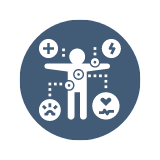You Can Help Us End Parkinson's
Early-onset and diagnosis of Parkinson’s can be life-changing. We strive to provide resources to help you live well with Parkinson’s and discover how you can take part in trials and communities near you.

We conduct research to slow and stop Parkinson's.
At SC3 Research, our goal is to advance the discovery of treatments for neurodegenerative diseases.
Help us get the treatment, support, research, and care people affected with Parkinson's deserve.
You can help to meet clinical research needs to get more efficient drugs to treat Parkinson's.
Early stage Parkinson's disease Facts

More than 10 million people worldwide are living with PD.


About 4 percent of people with PD are diagnosed before age 50.

Several treatments are being developed, making research vital.
- Slowed movement, also known as bradykinesia (steps are shorter when you walk, difficulties getting out of a chair, feet drag while walking, etc.)
- Rigid facial expressions
- Muscle stiffness that can be painful and limit your range of motion
- Changes in speech (becomes soft and slurred)
- Changes in writing (hard to write, writing becomes smaller)
- Losing your sense of smell
- Depression and emotional changes (fear, anxiety, loss of motivation)
Source: Parkinson's Foundation (https://www.parkinson.org/)
About Our Study
We are evaluating an investigational drug to determine if it might slow down the progression of Parkinson’s disease (PD).
We are conducting a phase 2 study designed to assess the safety, tolerability and efficacy of NLY01 in subjects with early untreated Parkinson's disease (PD).
NLY01, a pegylated form of exenatide, penetrates the blood–brain barrier (BBB) and its receptor (GLP-1R) is highly expressed on glial cells in Parkinson’s disease (PD) and Alzheimer’s disease (AD). Evidence suggests NLY01 may be beneficial in PD and is being developed as a potential treatment for neurodegenerative disorders.
Investigational Product: NLY01
Study Duration: Approximately 24 months total duration, which includes enrollment, treatment, and follow-up
Number of Clinic Visits: 10
%20(1).png)
Study Criteria
You may be eligible to join if you:
-
Are 30 to 80 years old.
-
Have early-stage Parkinson’s disease.
-
Not on any current treatments for PD.
Other criteria for eligibility apply.
Study participants receive study-related medical exams and study drugs at no cost.
About Clinical Research
Clinical research help to determine if treatments and other interventions are safe and effective. Researchers are committed to find solutions for everyone affected by Parkinson's disease— the very people who hold the key to the answers.
Be Part of the Solution
Many people don’t think about clinical research prior to a diagnosis; it may even seem frightening. But participating in research doesn’t have to be scary, unpleasant or time-consuming. It can be an empowering and impactful opportunity for people with Parkinson’s disease (PD) to help accelerate breakthroughs in treatment.
Need clarification?
Learn more about clinical trials and what it means for you.
Why Are Clinical Trials Conducted?
Clinical trials are essential to the development of new interventions (drugs, procedures, devices etc) that help people to live longer and with less pain or disability. They help researchers to understand what does and doesn’t work in humans that cannot be learned in the laboratory or in animals. Clinical trials also help doctors decide if the side effects of a new treatment are acceptable when weighed against the potential benefits. Clinical trials are also required by the health agencies prior to being sold and prescribed by doctors.
Your participation in this clincial trial can help the medical community bring new, life improving medications and treatment options to patients with Parkinson's Disease
What is the difference between a Phase II Trial and Phase III Trial?
Clinical trials are conducted in phases. The trials at each phase have a different purpose and help scientists answer different questions:
In Phase II trials, the study drug or treatment is given to a smaller group of patients (100-300) to see if it is effective and to further evaluate its safety.
In Phase III trials, the study drug or treatment is given to large groups of people (1,000-3,000) to confirm its effectiveness, monitor side effects, compare it to commonly used treatments, and collect information that will allow the drug or treatment to be used safely. Phase III trials are the last step before an investigational drug is approved for general use.
Why Should I Participate?
Your participation in a clinical trial can help the medical community bring new, life-improving medications and treatment options to patients.
If you choose to participate in a clinical trial you may receive investigational drugs and you will be closely followed up by a study doctor in regards to your disease.
Who Can Participate in a Clinical Trial?
Every clinical trial has a set of criteria that trial participants must meet in order to participate, including agreeing to sign an informed consent form and HIPAA authorization.
The ability and willingness to travel to the location of the clinical trial are also required.
Are study-related medical care expenses covered in association with the trials?
Yes, 100% of study-related medical care you receive in relation to the trials is covered by the trial sponsor. There is no insurance required to participate, no deductibles, no fees whatsoever. If you participate, there will be no cost for study-related exams, study drugs, and other related medical care
What about clinical trials participation during COVID-19?
This study requires in-person visits to the study site. Precautions are being taken to reduce the on-site risks of exposure to COVID-19. Each individual site location will review their protocols that include the use of masks, social distancing, and pre-appointment check-in. Study sites are medical facilities where COVID safety procedures are followed.
If you are or plan to be vaccinated with COVID-19, you may still be eligible for the studies. The COVID-19 vaccine can be administered before entering the study or afterward, without needing study drug interruption.
Can I speak with someone if I have questions?
Yes, you may message us through the live chat function that could be found in the bottom right section of the page.
Also, after you complete the online form or questionnaire and give permission to be contacted, a study representative will contact you. Prior to enrollment, you will have a chance to ask questions directly to the medical staff conducting the trial in your local area. The study coordinators will also give you the information you can review with your doctor.




